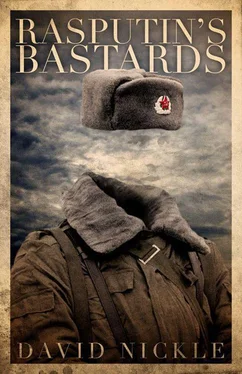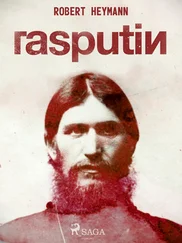So they moved along the ridge, until Vasili’s cries and the clanging of pitchforks blended in with the droning laments of the damned. Lena stopped, and looked down at the rock. Sure enough, it was smoother here — the cracks in the clay had a blurred quality to them. When Kolyokov put his hand against the firmament of Hell, it yielded like foam rubber before solidifying under his touch.
Lena knelt beside him — put her hand on his. She smiled at him. He smiled back. And as they touched, the ground shifted and bent, and the edge of the cliff extended. Lena took her hand away, stood, and stepped on the new ground they had made. It was the top landing of a long set of stairs cut into the cliffside, extending step by step down to the next circle of Hell.
“Abandon hope, ye who enter,” said Kolyokov.
“Stop showing off,” said Lena, “or I’ll report you. Now come on. This is our way in.”
There was a great fat demon waiting for them at the bottom — but he remained lethargic and indistinct while the American put his full attention on the defeat of the angelic Vasili. Lena and Kolyokov were able to sneak past him without incident.
Kolyokov was beginning to think the whole thing would be a piece of cake when, in the midst of a stony plaza approaching the blasted out archway of a bone white cathedral, he stepped into a puddle of flaming pitch. The pain was so intense that it was all he could do not to sit up in his tank back at City 512 and shriek like a baby. Lena hauled him back, and told him not to blame himself: the puddle had literally appeared as he stepped into it. They had apparently wandered into a psychic minefield. They both concentrated, and the pain vanished as his metaphorical foot reconstituted itself.
They took greater care as they resumed their march — and for that, still trod on sudden spikes and razors and lengths of barbed wire that popped up unavoidably as they made their way along.
They met Vasili again at the edge of the next circle, and for the next phase of their journey, faced the defences of the American head-on: clouds of flesh-stripping locusts and great black tentacles, sudden gouts of red-hot magma that leapt at them from fresh-cut fissures in the rock.
They battled an immense two-headed serpent and played a riddle game with a hunchback, and cut their way through a great rose bush that grew thorns long as fingers.
Finally, on a basalt mountain in the midst of the ice field that encrusted the firmament of Hell’s centre, they met the American himself: a giant, black-skinned demon with wings pulled from a bat and thick-lidded eyes that glowed like headlamps.
“‘Night on Bald Mountain.’ How unoriginal,” said Lena.
The American Satan let out a terrible roar.
“But what do you expect from Americans?” she continued. “They drop a little LSD on their tongues or chew on the peyote, and think they can control the world. You’re better than most — I’ll give you that. But still — the best you can come up with for your defence is an image you stole from a Walt Disney film.”
Lucifer the American shrieked, swelled his immense chest and spread his wings so they blacked out the sky.
“Oh, that and I suppose your vaunted faith. But really. Fantasia ? Why don’t you just have the mouse send broomsticks after us? That is every bit as terrifying as this scribble of a demon you’ve made of yourself.”
Kolyokov could see the metaphor beginning to dissolve, as Lena’s words cut through the Yank Beelzebub’s belief. That was always key to defeating these things — destroy the belief in the metaphor, and it begins to crumble. Keep playing by its rules — and it grows stronger.
“Or what,” she continued, “about that funny dog? What is his name—”
The demon’s wings began to show light through them, like thinning fabric —
“Pluto?”
The creature opened its mouth and closed it again. The light in its eyes began to dim. And so it began: the American’s metaphor of Hell began to fragment and collapse upon itself.
She’d made it look easy. But afterward, Lena told them that she’d only encountered stronger defences in the best of the younger generations — younger even than Kolyokov’s. This one — John Kaye was his true name; they’d managed to extract that from the mewling remains of the American agent — must have been an aberration to have built up such a fortress around his mind, and Lena suggested they keep him alive for his genetic material if nothing else.
“You are still breeding at City 512, aren’t you?” she said, looking directly at Kolyokov as she spoke.
“That is the main of our work there,” said Vasili, his wings drooping forlornly by this point.
“Ah, yes,” said Kolyokov. “Mostly that is what we do there now.” At their feet, Kaye had mostly finished twitching, and the KGB men had come back into the room. Lena got up from the creaky old rocking chair just as one of the agents moved to sit down on it.
At this point, she’d shed her robe to reveal a pair of dark slacks and a baggy grey turtleneck sweater. It would have been a complete contrast to Vasili’s outlandish seraphim getup but for her face; her eyes in particular, which she had crafted into a sum of what was to Kolyokov at any rate, womanly perfection. He couldn’t stop staring at her — even, he found, when she stared levelly back, as she was doing now.
“Well,” she said, “I think we are finished here. Vasili, my dear?”
“Yes!” Vasili’s wings perked and spread, and his face flushed red. “I mean — yes… my dear?”
“Why don’t you use those magnificent wings to fly back to City 512 with our report?”
“But—” poor Vasili’s face took on a puzzled mask “—I thought I’d send Comrade Kolyokov back. So we might—”
Lena raised a finger. “We might not,” she said. “Comrade Kolyokov can wait here a minute. I’ve some questions for him before he departs.”
“But—”
Lena’s finger pointed to the window. “Go,” she commanded.
Although he clearly was not pleased about it, Vasili had no choice but to obey. No one did, Kolyokov would later reflect bitterly, when Lena commanded.
The farmstead soon emptied after Vasili returned to his tank, and City 512 sent back a radio message that the interrogation was finished. The agents all but bolted from what to them must have been a haunted building. Kolyokov wondered if it was their laughter that drove the agents so quickly. Lena wiped a crystalline tear from a perfect eye and settled back into the rocking chair.
“So tell me now honestly,” she said. “Did you enjoy your first time outside City 512?”
Fyodor sat on the edge of the bed, and shrugged in what he hoped was a worldly way. “It was not my first time,” he said. “I have performed many successful operations in Leningrad and Moscow.”
“Yes,” she said. “Playing the sleepers, isn’t that right? Making them check up on their traitorous neighbours, rounding up the dissidents. That’s good — but it’s not the same thing as dream-walking here, is it?”
Now Fyodor felt himself blushing. “No,” he said. “Not really.”
“Well, I’ve enjoyed my trip here to Germany too,” said Lena. “I’ll tell you — there’s one place in the world that’s worse than City 512: Toronto. In January.”
Fyodor laughed at that, and looked up. “Toronto. That’s right. Vasili said you were the Canadian.”
Lena shook her head. “Not Canadian,” she said. “Russian. In Canada, true, but Russian.”
“Are there many of you there?” Fyodor tried to imagine an operation the size of City 512 in hostile territory.
“No,” she said. “Just me for now. But—” she smiled in a way that gave Fyodor a chill “—that won’t be for long. I’m making friends.”
Читать дальше












